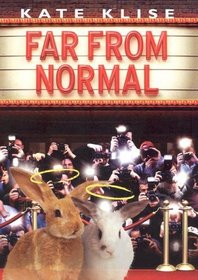Reviewed by Mechele R. Dillard for TeensReadToo.com
Fourteen-year-old Charles Harrisong cannot understand why God hates him, but he knows that He does: "How could You abandon me and my family like this. Never mind. Don't answer that. I already know. It's because You hate me. Amen" (p. 217). All of the praying and begging and promising he has done over the years has gotten him nowhere. Rather, it has gotten him everywhere he doesn't want to be: far from normal. "My family," he muses. "We were turning into a vaudeville act" (p. 234).
Klise's story is confusing at times, and the motivation for the family to run from their previous home in Normal, Illinois, and live on a houseboat--the rickety S. S. O'Migosh--just doesn't make sense, even with the knowledge that there is an earlier book, DELIVER US FROM NORMAL, dedicated to the explanation of the situation. The family had been labeled "poor white trash," so they snuck out of town in the middle of the night, like criminals, and headed for Alabama and a life on the water? Mmmmmm, okay, I guess.
Leaving the original story behind, the depiction of the Harrisongs as they unwillingly and unknowingly become prisoners of megastore Bargain Bonanza is an interesting metaphor for society today. Yes, it's true, we are all caught in the net of one "superstore" or another, whether we wish to be or not, and, yes, the little man has become completely helpless in the shadow of the wealth and power driving humanity today. We are all captives of the "superstore," and there is little we can do to free ourselves at this point, as most of us don't even realize we are prisoners.
My concern with FAR FROM NORMAL, ultimately, is not the improbability of some of the situations or the confusing twists and timelines, but that the underlying message may be missed by the audience, especially younger readers. Few teens are reading Hegel, after all, and the use of his words to inspire Charles seems odd to me: Is this scenario a case of "right against right" (p. 118)?
Still, Klise's words have the potential to make a reader puzzle, think, consider, question, search, and discover, and, as these are goals of good young adult literature, I believe FAR FROM NORMAL to be a positive addition to any reading list.
Fourteen-year-old Charles Harrisong cannot understand why God hates him, but he knows that He does: "How could You abandon me and my family like this. Never mind. Don't answer that. I already know. It's because You hate me. Amen" (p. 217). All of the praying and begging and promising he has done over the years has gotten him nowhere. Rather, it has gotten him everywhere he doesn't want to be: far from normal. "My family," he muses. "We were turning into a vaudeville act" (p. 234).
Klise's story is confusing at times, and the motivation for the family to run from their previous home in Normal, Illinois, and live on a houseboat--the rickety S. S. O'Migosh--just doesn't make sense, even with the knowledge that there is an earlier book, DELIVER US FROM NORMAL, dedicated to the explanation of the situation. The family had been labeled "poor white trash," so they snuck out of town in the middle of the night, like criminals, and headed for Alabama and a life on the water? Mmmmmm, okay, I guess.
Leaving the original story behind, the depiction of the Harrisongs as they unwillingly and unknowingly become prisoners of megastore Bargain Bonanza is an interesting metaphor for society today. Yes, it's true, we are all caught in the net of one "superstore" or another, whether we wish to be or not, and, yes, the little man has become completely helpless in the shadow of the wealth and power driving humanity today. We are all captives of the "superstore," and there is little we can do to free ourselves at this point, as most of us don't even realize we are prisoners.
My concern with FAR FROM NORMAL, ultimately, is not the improbability of some of the situations or the confusing twists and timelines, but that the underlying message may be missed by the audience, especially younger readers. Few teens are reading Hegel, after all, and the use of his words to inspire Charles seems odd to me: Is this scenario a case of "right against right" (p. 118)?
Still, Klise's words have the potential to make a reader puzzle, think, consider, question, search, and discover, and, as these are goals of good young adult literature, I believe FAR FROM NORMAL to be a positive addition to any reading list.




